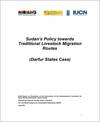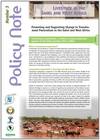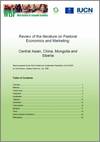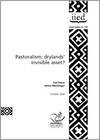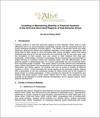The study contributes to building an enabling environment for pastoral sustainable rangeland management through enhanced local-level advocacy based on sound knowledge management on the impact of current policies on pastoralism. This Sudan case study is focused on the national policy towards Traditional Livestock Migration Routes (Darfur States Case). The study evaluates the success of the intervention carried by The Administrative Committee for Routes Delineation - Darfur States (ACRD-DS) and the impact this has had on the wider pastoralist environment. It contributes to WISP’s efforts to demonstrate that, given an enabling policy environment, pastoralists can be the best custodians of the drylands environment.
Year of publication: 2007Organization: GEF Global Environmental Facility, Individual authors, International Union for Conservation of Nature (IUCN)
Topic: Organization
Language: English
Type of document: Technical
Geographical coverage: Eastern Africa
Transhumant pastoralism is a reality in animal production systems in the Sahel and West Africa (SWA), which despite its importance, it still faces serious obstacles that threaten its potential production. This policy note aims at highlighting the best ways at international and regional levels in order to develop and implement policies and strategies aimed to support transhumant pastoralism while creating conditions for change to sedentary agro-pastoralism.
Year of publication: 2007Organization: Individual authors, World Bank
Topic: Economy, Innovation
Language: English
Type of document: Policies and legislation
Geographical coverage: North Africa, West Africa, Central Africa
Mobile pastoralism is the most sustainable way to manage the World’s rangelands, and alternative land-uses come at an environmental and an economic cost. The magnitude of those costs is not properly understood, and they may well be incurred with many people not noticing. If countries that possess significant rangelands desire to reverse desertification and overcome poverty, then it is crucial that they recognise the environmental logic of mobile pastoralism and its great economic potential.
Year of publication: 2007Organization: International Union for Conservation of Nature (IUCN)
Topic: Economy
Language: 中文, English, Français, Español
Type of document: Policies and legislation
Geographical coverage: Global
This review of the literature on pastoralist economics is a contribution to the global learning on the importance of mobile pastoralism as a form of productive and sustainable land management. The review is intended to highlight existing knowledge on the value of pastoralism, the gaps in this knowledge, trends in pastoral economies and policy options that can support drylands economies most effectively.
Year of publication: 2006Organization: International Union for Conservation of Nature (IUCN)
Topic: Economy
Language: English, Français, Español
Type of document: Technical
Geographical coverage: Global
Eight regional studies were carried out in the context of the Global review of the economics of pastoralism. The studies identify how pastoralism contributes to domestic and global markets in different regions. The studies capture the following regions: Horn of Africa and Southern Africa; West Africa; Eastern Africa; Northern Africa; South America; Asia; Middle East; and Europe.
Year of publication: 2006Organization: International Union for Conservation of Nature (IUCN)
Topic: Economy
Language: English
Type of document: Technical
Geographical coverage: North America, Latin America, Europe, Near East, North Africa, West Africa, Central Africa, Eastern Africa, Southern Africa, Central Asia, South Asia
Many policy makers in East Africa have preconceptions about the value of pastoralism as a land-use system believing it to be economically inefficient and environmentally destructive. Yet, this is not evidence-based. Not only is there no consensus on what is a dynamic economic model of pastoralism, no mechanisms exist to inform government decision-making of its comparative advantages over alternative land uses. A new conceptual framework is needed to assess the value of pastoralism that goes beyond conventional economic criteria in order to provide fresh insights to its contribution to poverty reduction, sustainable environmental management and the economic development of dryland areas of East Africa in the context of increasing climate uncertainty. This paper proposes such a framework.
Year of publication: 2006Organization: International Institute for Environment and Development (IIED)
Topic: Economy, Value addition
Language: English, Français
Type of document: Technical
Geographical coverage: Eastern Africa
This paper seeks to provide national and international policy-makers interested in the development of arid and semi-arid areas with background information and policy options, on whether and how to invest in mobility of pastoral systems in Africa. It first describes the trends leading to declining mobility, followed by a description of the key underlying causes for these trends and their impacts on mobile pastoralists. It then provides the rationale for investments and concludes with policy options which policy-makers face when deciding on priorities to be allocated to overall pastoral development, and to specific actions within pastoral development.
Year of publication: 2006Organization: Food and Agriculture Organization of the United Nations (FAO)
Topic: Economy, Value addition
Language: English
Type of document: Technical
Geographical coverage: West Africa, Central Africa, Eastern Africa, Southern Africa
This toolkit gathers together information on 10 tools that have been successfully used by members of the International Land Coalition (ILC) to promote, protect, and strengthen the land rights of Indigenous Peoples and local communities. It is intended to facilitate mutual learning based on the good practices of specific ILC members. The opportunity to share knowledge is one of the main benefits of being part of a network like the ILC. Use these tools, adapt them to your specific context, share them with your partner organisations, and share with us your achievements and successes!
Year of publication: 2005Organization: International Land Coalition (ILC)
Topic: Conflict, Environmental services, Indigenous peoples, Land, Participation
Language: English
Type of document: Technical
Geographical coverage: Global


